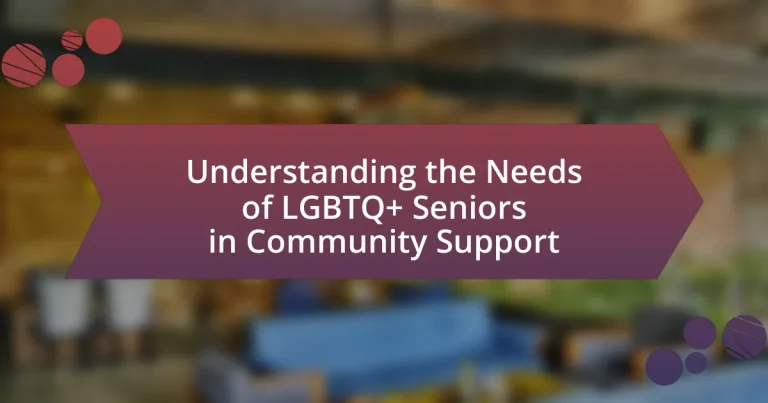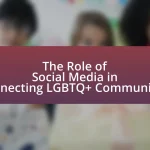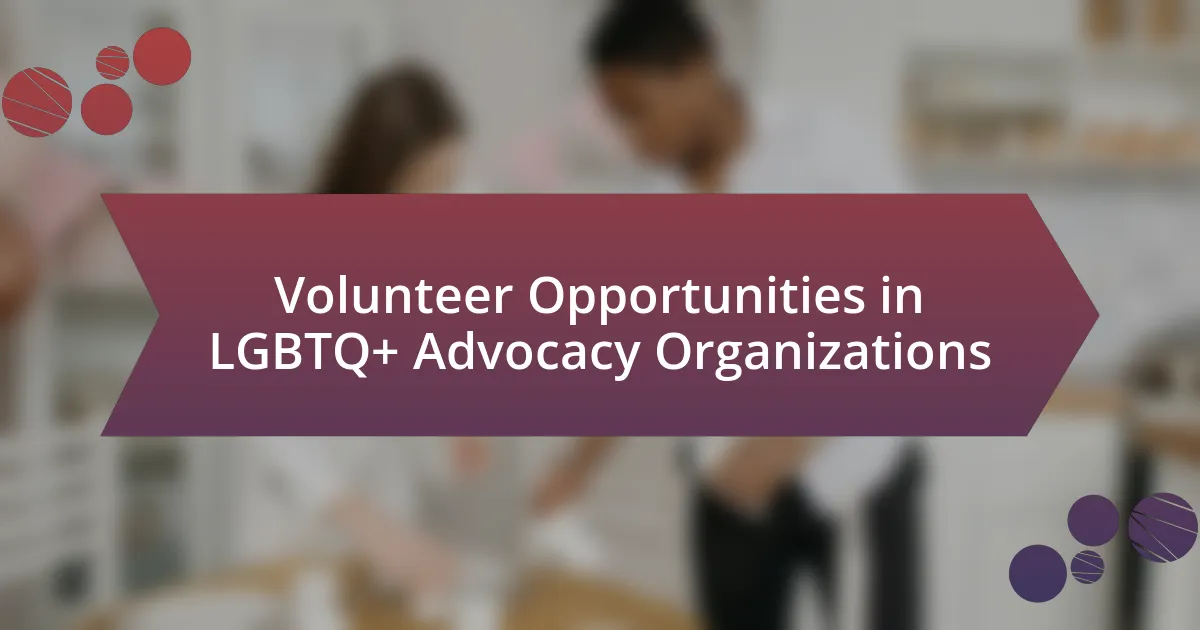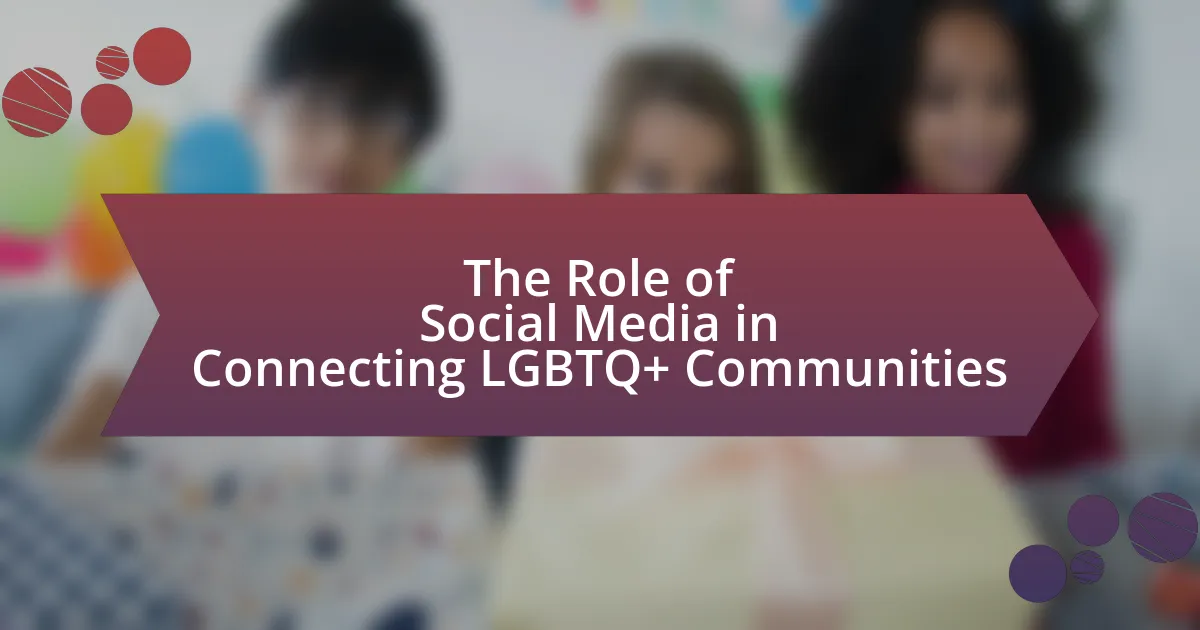The article focuses on the unique needs of LGBTQ+ seniors in community support, highlighting their challenges related to social acceptance, healthcare access, and discrimination. It discusses the impact of social factors on their well-being, emphasizing the prevalence of isolation and mental health issues among this demographic. The article also examines specific health concerns faced by LGBTQ+ seniors, including chronic illnesses and barriers to healthcare, while outlining available resources and community organizations dedicated to supporting them. Additionally, it explores strategies for improving community support systems, enhancing inclusivity, and fostering connections through technology and peer support groups.

What are the unique needs of LGBTQ+ seniors in community support?
LGBTQ+ seniors have unique needs in community support that include social acceptance, access to culturally competent healthcare, and protection from discrimination. These individuals often face isolation due to a lack of inclusive social networks and may experience mental health challenges stemming from historical marginalization. Research indicates that LGBTQ+ seniors are more likely to experience loneliness and depression compared to their heterosexual counterparts, highlighting the necessity for supportive community programs that foster connection and belonging. Additionally, studies show that LGBTQ+ seniors often encounter barriers in accessing healthcare services, necessitating training for healthcare providers to ensure they deliver respectful and informed care.
How do social factors impact the well-being of LGBTQ+ seniors?
Social factors significantly impact the well-being of LGBTQ+ seniors by influencing their mental health, social connections, and access to resources. For instance, social isolation is prevalent among LGBTQ+ seniors due to historical stigma and discrimination, leading to increased feelings of loneliness and depression. According to a study published in the Journal of Homosexuality, LGBTQ+ seniors report higher rates of mental health issues compared to their heterosexual counterparts, largely due to societal rejection and lack of support networks. Additionally, supportive community environments can enhance their quality of life, as access to LGBTQ+-friendly services and social groups fosters a sense of belonging and reduces isolation. Thus, the presence or absence of supportive social factors directly correlates with the overall well-being of LGBTQ+ seniors.
What role does isolation play in the lives of LGBTQ+ seniors?
Isolation significantly impacts the lives of LGBTQ+ seniors by exacerbating feelings of loneliness and reducing access to social support networks. Many LGBTQ+ seniors face unique challenges, such as discrimination and stigma, which can lead to social isolation, particularly if they lack supportive family or community connections. Research indicates that approximately 40% of LGBTQ+ seniors experience loneliness, compared to 27% of their heterosexual counterparts, highlighting the critical need for targeted community support initiatives to address these disparities.
How does discrimination affect LGBTQ+ seniors’ access to community support?
Discrimination significantly limits LGBTQ+ seniors’ access to community support by fostering an environment of fear and mistrust. Many LGBTQ+ seniors have experienced stigma and exclusion throughout their lives, leading to reluctance in seeking assistance from community organizations that may not be inclusive or sensitive to their needs. Research indicates that 43% of LGBTQ+ seniors report feeling isolated due to discrimination, which directly impacts their willingness to engage with available support services. Furthermore, studies show that LGBTQ+ seniors are less likely to access healthcare and social services, as they often anticipate negative treatment based on their sexual orientation or gender identity. This systemic discrimination creates barriers that hinder their ability to receive essential community support.
What specific health concerns do LGBTQ+ seniors face?
LGBTQ+ seniors face specific health concerns including mental health issues, chronic illnesses, and barriers to healthcare access. Mental health challenges, such as depression and anxiety, are prevalent due to historical stigma and discrimination, with studies indicating that LGBTQ+ individuals are at a higher risk for these conditions compared to their heterosexual counterparts. Chronic illnesses, including heart disease and diabetes, are also significant, as LGBTQ+ seniors may experience higher rates of these conditions due to lifestyle factors and lack of preventive care. Additionally, barriers to healthcare access, such as discrimination from healthcare providers and lack of culturally competent care, further exacerbate health disparities in this population. According to the National LGBTQ Task Force, 56% of LGBTQ+ seniors reported experiencing discrimination in healthcare settings, highlighting the urgent need for tailored support and resources.
How do mental health issues manifest in LGBTQ+ seniors?
Mental health issues in LGBTQ+ seniors often manifest as depression, anxiety, and social isolation. These manifestations are frequently exacerbated by experiences of discrimination, stigma, and a lack of support systems. Research indicates that LGBTQ+ seniors are at a higher risk for mental health challenges due to historical marginalization and ongoing societal biases. For instance, a study published in the American Journal of Public Health found that LGBTQ+ older adults reported significantly higher rates of depression compared to their heterosexual counterparts. Additionally, feelings of loneliness and isolation are prevalent, as many LGBTQ+ seniors may have lost friends and partners to illness or may not have family support. These factors contribute to a complex interplay of mental health issues that require targeted community support and resources.
What are the common physical health challenges for LGBTQ+ seniors?
Common physical health challenges for LGBTQ+ seniors include higher rates of chronic conditions such as cardiovascular disease, diabetes, and obesity. Research indicates that LGBTQ+ seniors often face barriers to healthcare access, leading to delayed diagnoses and treatment. For instance, a study published in the Journal of Aging and Health found that LGBTQ+ older adults report more health issues compared to their heterosexual peers, partly due to stigma and discrimination in healthcare settings. Additionally, mental health issues, including depression and anxiety, can exacerbate physical health problems, further complicating their overall health status.
What resources are available for LGBTQ+ seniors in community support?
LGBTQ+ seniors have access to various community support resources, including specialized organizations, social services, and health programs. Organizations such as SAGE (Services and Advocacy for GLBT Elders) provide advocacy, social services, and resources tailored to the needs of LGBTQ+ older adults. Additionally, local LGBTQ+ community centers often offer support groups, social activities, and health services specifically designed for seniors. Research indicates that LGBTQ+ seniors face unique challenges, including social isolation and discrimination, making these resources essential for their well-being and community engagement.
How can LGBTQ+ seniors access healthcare services tailored to their needs?
LGBTQ+ seniors can access healthcare services tailored to their needs by seeking out LGBTQ+-friendly healthcare providers and organizations that specialize in geriatric care. Many healthcare facilities now offer training for staff on LGBTQ+ issues, ensuring a more inclusive environment. For instance, the National LGBTQ Task Force provides resources and directories to help seniors find appropriate healthcare services. Additionally, community organizations like SAGE (Services and Advocacy for GLBT Elders) offer programs specifically designed to address the unique health concerns of LGBTQ+ seniors, including mental health support and social services. These resources are crucial as studies indicate that LGBTQ+ seniors often face higher rates of discrimination in healthcare settings, which can lead to barriers in accessing necessary care.
What community organizations focus on supporting LGBTQ+ seniors?
Community organizations that focus on supporting LGBTQ+ seniors include SAGE (Services and Advocacy for GLBT Elders), which provides advocacy, services, and programs specifically for LGBTQ+ older adults. Additionally, the LGBTQ+ Elder Initiative offers resources and support tailored to the needs of LGBTQ+ seniors. These organizations address issues such as social isolation, healthcare access, and discrimination, ensuring that LGBTQ+ seniors receive the necessary support and community engagement.

How can community support systems be improved for LGBTQ+ seniors?
Community support systems for LGBTQ+ seniors can be improved by enhancing inclusivity and accessibility in services. This can be achieved through targeted outreach programs that specifically address the unique challenges faced by LGBTQ+ seniors, such as social isolation and discrimination. Research indicates that LGBTQ+ seniors experience higher rates of loneliness and mental health issues compared to their heterosexual counterparts, highlighting the need for tailored support services. Additionally, training staff in cultural competency and sensitivity regarding LGBTQ+ issues can foster a more welcoming environment. Implementing peer support groups and social activities that celebrate LGBTQ+ identities can also strengthen community ties and provide essential emotional support.
What strategies can enhance inclusivity in community programs?
To enhance inclusivity in community programs, implementing targeted outreach and engagement strategies is essential. These strategies include conducting needs assessments specifically focused on LGBTQ+ seniors to identify their unique challenges and preferences. Research indicates that inclusive programs that actively involve LGBTQ+ seniors in the planning process lead to higher participation rates and satisfaction levels. For instance, a study by the AARP found that 70% of LGBTQ+ seniors feel more comfortable in environments that acknowledge and address their specific needs. Additionally, training staff on LGBTQ+ cultural competency fosters a welcoming atmosphere, further promoting inclusivity.
How can training for staff improve service delivery to LGBTQ+ seniors?
Training for staff can significantly improve service delivery to LGBTQ+ seniors by equipping them with the knowledge and skills necessary to address the unique challenges faced by this demographic. Staff trained in LGBTQ+ cultural competency can foster an inclusive environment, reducing instances of discrimination and enhancing trust between seniors and service providers. Research indicates that 70% of LGBTQ+ seniors report experiencing discrimination in healthcare settings, highlighting the need for staff training to mitigate these issues and improve overall care quality. By understanding specific health concerns and social needs, trained staff can provide tailored support, ultimately leading to better health outcomes and increased satisfaction among LGBTQ+ seniors.
What role do peer support groups play in community engagement?
Peer support groups play a crucial role in community engagement by fostering connections among individuals with shared experiences, particularly within the LGBTQ+ senior population. These groups provide a safe space for members to share personal stories, challenges, and resources, which enhances social cohesion and reduces feelings of isolation. Research indicates that participation in peer support groups can lead to improved mental health outcomes and increased community involvement, as members often feel empowered to advocate for their needs and rights. For instance, a study published in the Journal of Community Psychology found that LGBTQ+ seniors who engaged in peer support reported higher levels of community participation and satisfaction, demonstrating the effectiveness of these groups in promoting active engagement within the community.
How can technology aid in supporting LGBTQ+ seniors?
Technology can aid in supporting LGBTQ+ seniors by providing platforms for social connection, access to resources, and tailored health services. Online communities and social media enable LGBTQ+ seniors to connect with peers, reducing feelings of isolation, which is crucial as studies show that social support significantly impacts mental health in older adults. Telehealth services offer LGBTQ+ seniors access to healthcare professionals who are culturally competent, addressing specific health concerns such as mental health issues and chronic conditions prevalent in this demographic. Additionally, technology can facilitate access to information about local LGBTQ+ resources, support groups, and events, enhancing community engagement and support networks.
What online resources are beneficial for LGBTQ+ seniors seeking support?
Online resources beneficial for LGBTQ+ seniors seeking support include organizations such as SAGE (Services and Advocacy for GLBT Elders), which provides resources, advocacy, and social services tailored to older LGBTQ+ individuals. Additionally, the LGBTQ+ Elder Initiative offers information and support specifically for LGBTQ+ seniors, focusing on health, social services, and community engagement. The Human Rights Campaign also provides resources and guides for LGBTQ+ seniors, addressing issues like healthcare and legal rights. These organizations are recognized for their commitment to improving the quality of life for LGBTQ+ seniors through targeted support and advocacy efforts.
How can social media foster connections among LGBTQ+ seniors?
Social media can foster connections among LGBTQ+ seniors by providing platforms for communication, community building, and support. These platforms enable seniors to engage with others who share similar experiences and identities, reducing feelings of isolation. Research indicates that social media usage among older adults has increased, with 59% of seniors aged 65 and older using social networking sites, which facilitates interaction and connection (Pew Research Center, 2021). Additionally, online groups and forums specifically for LGBTQ+ seniors allow for sharing resources, experiences, and emotional support, enhancing their sense of belonging and community.

What are the best practices for supporting LGBTQ+ seniors in community settings?
The best practices for supporting LGBTQ+ seniors in community settings include creating inclusive environments, providing staff training on LGBTQ+ issues, and ensuring access to culturally competent healthcare. Inclusive environments foster a sense of belonging and safety, which is crucial for LGBTQ+ seniors who may have faced discrimination. Staff training equips caregivers with the knowledge to address the unique challenges faced by LGBTQ+ individuals, such as social isolation and mental health concerns. Access to culturally competent healthcare ensures that LGBTQ+ seniors receive appropriate medical care that respects their identities and experiences. Research indicates that LGBTQ+ seniors are at a higher risk for mental health issues, with 39% reporting depression compared to 22% of their heterosexual counterparts, highlighting the need for targeted support.
How can communities create safe spaces for LGBTQ+ seniors?
Communities can create safe spaces for LGBTQ+ seniors by establishing inclusive programs and environments that prioritize acceptance and support. This can be achieved through the implementation of anti-discrimination policies, the training of staff and volunteers on LGBTQ+ issues, and the creation of dedicated social groups that foster connection among LGBTQ+ seniors. Research indicates that environments promoting inclusivity significantly improve the mental health and well-being of LGBTQ+ individuals, as highlighted in the 2020 report by the Human Rights Campaign, which found that 70% of LGBTQ+ seniors feel isolated. By actively engaging LGBTQ+ seniors in the planning and execution of these initiatives, communities can ensure that their specific needs and preferences are met, further enhancing the sense of safety and belonging.
What policies should be implemented to protect LGBTQ+ seniors’ rights?
To protect LGBTQ+ seniors’ rights, policies should include anti-discrimination laws specifically addressing age and sexual orientation, ensuring equal access to healthcare, housing, and social services. Implementing comprehensive training programs for service providers on LGBTQ+ issues can enhance understanding and reduce bias. Additionally, establishing support networks and resources tailored for LGBTQ+ seniors can foster community engagement and provide necessary assistance. Research indicates that LGBTQ+ seniors face higher rates of isolation and discrimination, highlighting the need for targeted policies to address these challenges effectively.
How can community events be designed to be inclusive for LGBTQ+ seniors?
Community events can be designed to be inclusive for LGBTQ+ seniors by ensuring representation, accessibility, and a welcoming environment. Representation can be achieved by involving LGBTQ+ seniors in the planning process, which fosters a sense of ownership and ensures that their specific needs and preferences are addressed. Accessibility involves providing physical accommodations, such as wheelchair access and transportation options, as well as considering sensory-friendly environments that cater to diverse needs. Creating a welcoming environment includes using inclusive language, promoting diverse role models, and offering programming that reflects LGBTQ+ culture and history. Research indicates that inclusive practices enhance participation and satisfaction among LGBTQ+ seniors, as highlighted in the report “LGBTQ+ Aging: A Review of the Literature” by the National Resource Center on LGBTQ+ Aging.
What practical steps can individuals take to support LGBTQ+ seniors?
Individuals can support LGBTQ+ seniors by fostering inclusive environments and providing resources tailored to their unique needs. This can be achieved through actions such as advocating for LGBTQ+ friendly healthcare services, which are crucial as studies show that LGBTQ+ seniors often face discrimination in medical settings. Additionally, individuals can volunteer with organizations that focus on LGBTQ+ elder care, helping to create social programs that combat isolation, a significant issue for this demographic. Providing companionship and engaging in community activities can also enhance their quality of life, as research indicates that social connections are vital for mental health in older adults. Furthermore, educating oneself and others about the specific challenges faced by LGBTQ+ seniors can promote understanding and acceptance, leading to a more supportive community overall.
How can friends and family provide meaningful support to LGBTQ+ seniors?
Friends and family can provide meaningful support to LGBTQ+ seniors by fostering an inclusive and affirming environment that acknowledges their unique experiences and challenges. This support can include actively listening to their concerns, validating their identities, and advocating for their rights within healthcare and community settings. Research indicates that LGBTQ+ seniors often face higher rates of isolation and mental health issues; thus, regular social interaction and emotional support from loved ones can significantly enhance their well-being. Additionally, providing assistance with navigating healthcare systems, ensuring access to LGBTQ+-friendly services, and participating in community activities together can further strengthen their sense of belonging and security.
What volunteer opportunities exist for those wanting to help LGBTQ+ seniors?
Volunteer opportunities for those wanting to help LGBTQ+ seniors include providing companionship through local senior centers, participating in outreach programs that focus on health and wellness, and assisting with events organized by LGBTQ+ advocacy groups. Organizations such as SAGE (Services and Advocacy for GLBT Elders) offer structured volunteer programs where individuals can engage in activities like social visits, meal delivery, and educational workshops tailored to the needs of LGBTQ+ seniors. These initiatives are essential as they address the social isolation and unique challenges faced by this demographic, fostering a supportive community environment.





